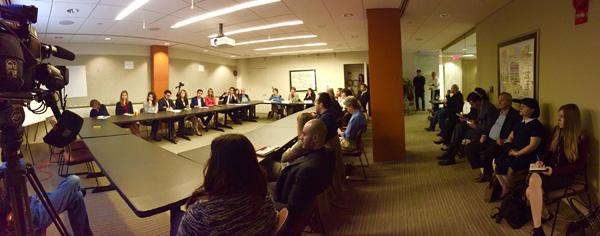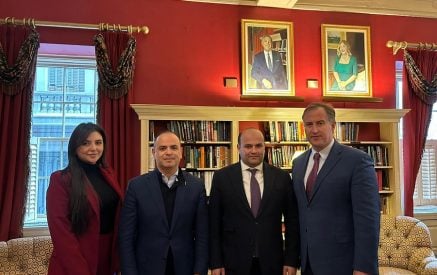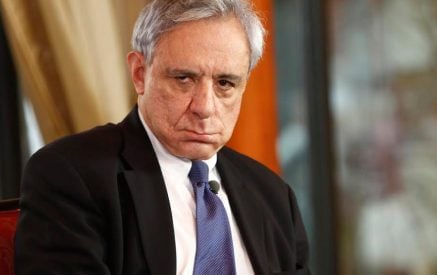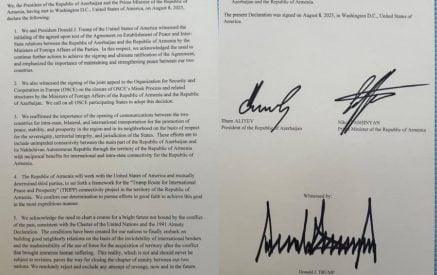On October 13, 2016, Policy Forum Armenia hosted a panel discussion that brought together speakers from the Armenian Helsinki Committee, Transparency International Anti-Corruption Center, Human Rights Watch, National Endowment for Democracy, American Bar Association, and George Washington University Law School.
The panelists highlighted the deteriorating human rights and rule-of-law conditions in Armenia in recent years. The shortcomings of the constitutional framework, which allows ultimate concentration of power in the hands of a single individual, and corruption were seen as key factors behind the trend. The latter is exacerbated by its systemic nature, convergence between the political and business elites, and the lack of independent judiciary. The panelists also noted the importance of the geopolitical context, particularly Armenia’s dependence on Russia, for understanding the conditions on the ground. The 4-day war in April left many in the society unsure about the security situation going forward and ability of Russia to act as a guarantor of stability in the region.
Regarding the July events that followed, the panelists noted the outpouring of the popular support—in a “Robin Hood” effect—an outcome of frustration with poor economic and social conditions as well as the lack of political will to fight against corruption and undertake reform.
The panel stressed that the accompanying protests were overwhelmingly peaceful. Instead, police used excessive force (especially on July 29), giving no warning to disperse the crowd, other than the punitive and indiscriminate attacks and beatings. Singling out journalists was especially troubling and the use of police in civilian clothing raises the issue of accountability. Panelists noted that these events have been overwhelmingly condemned by the international community.
Read also
The panel called for the actions of the police in July 2016 in Yerevan to be thoroughly investigated. It noted that in the past investigations rarely led to any prosecutions. However, the panelists stated that mere dismissals of officials accused in wrong-doings is insufficient to restore public trust and ensure true accountability. Besides, it leaves an impression that the power is concentrated in a few hands, who can decide “who stays and who goes.”
The panel condemned the beatings and inhumane treatment of protesters following their arbitrary detention, including depriving detainees of food, medication as well as access to legal help and family members for extended periods of time, against the legal requirement. It noted that international best practice requires that peaceful protests be tolerated, even if they are unauthorized.
At least 40 individuals—including protest leaders—have been charged with organizing “mass disorder”, a charge that carries a possible prison sentence of up to 10 years. Panelists noted that these charges are disproportionate and unjustified, given that the protests were non-violent. The number of political prisoners in Armenia has increased significantly in connection with the July events, the most prominent of them being Shant Harutyunyan, Hayk Kyureghyan, Andreas Ghukasyan, Jirayr Sefilian, Garo Yegnukian, and Gevorg Safaryan.
Related to this, the panel criticized the sweeping use of pre-trial detention by the law-enforcement, and noted that in the (pre-trial) hearings the prosecutors did not provide sufficient facts that would support the need for custody. The panelists called on the authorities to review these decisions and replace them with the least restrictive measures, consistent with charges brought forth.
The panelists stressed that the July events provide an alarming backdrop for the April 2017 election in Armenia, where several issues remain unaddressed and the low trust towards political parties and processes in Armenia is widespread. They noted that one of the ways the Diaspora can help is by taking part in the election monitoring effort on the ground and helping to analyze election outcomes.
The panel concluded that Armenia has a strong, active, and educated civil society willing to fight for its rights and push for a change. However, their actions remain isolated and often the technical and material support is lacking to make their efforts more effective. On a positive side, the formation of the Chamber of Advocates and the Public Defender’s office were seen as positive developments, aiding the protection of human rights and individual freedoms in the country.
Policy Forum Armenia

























































